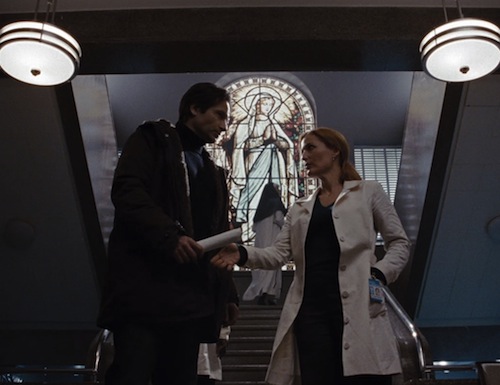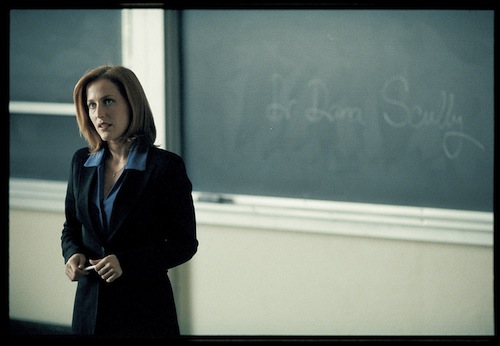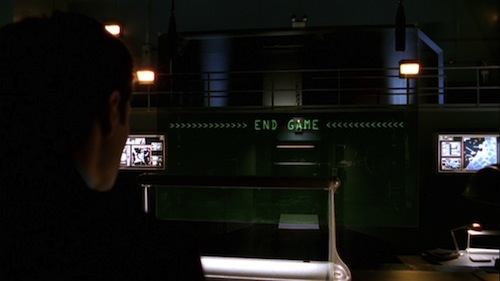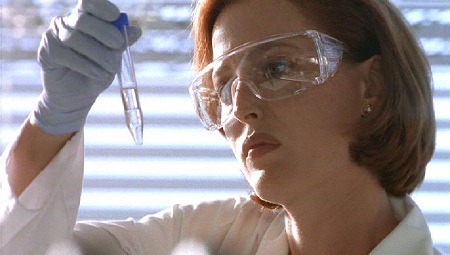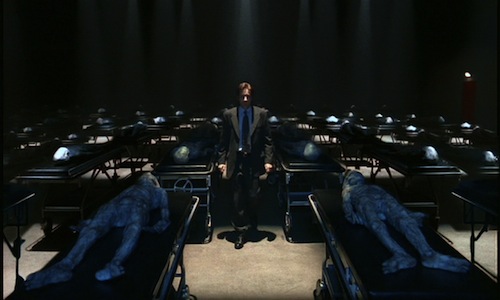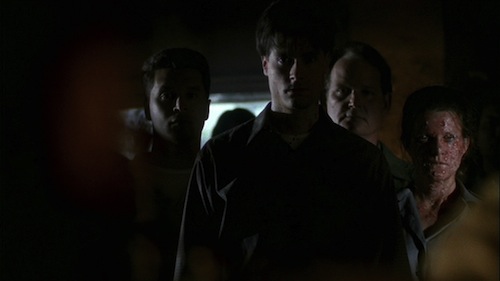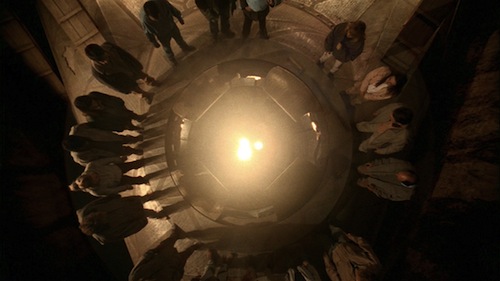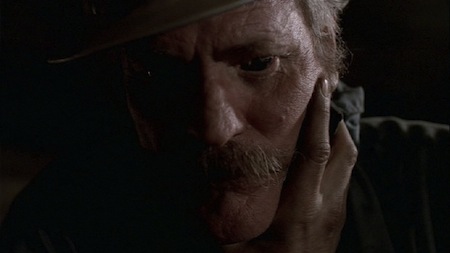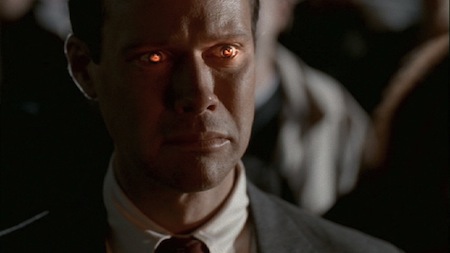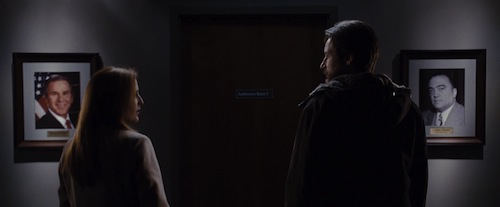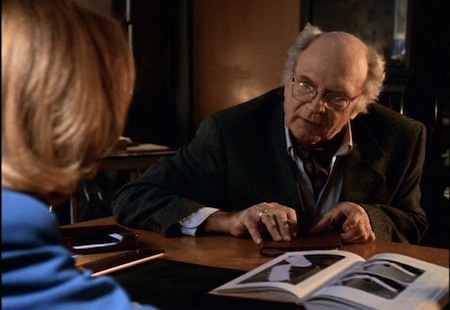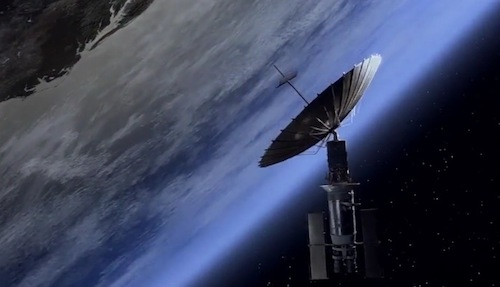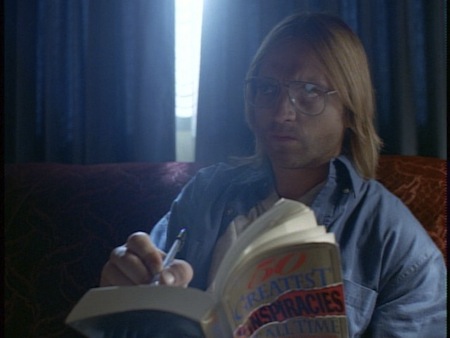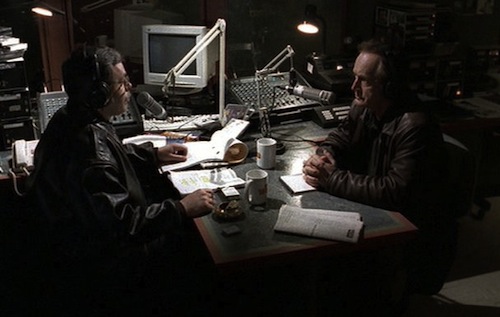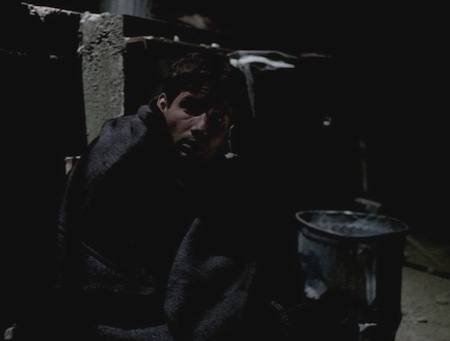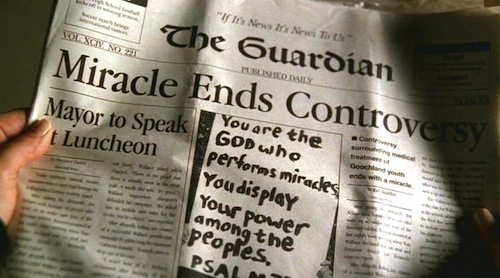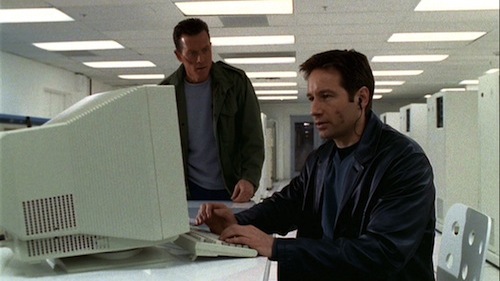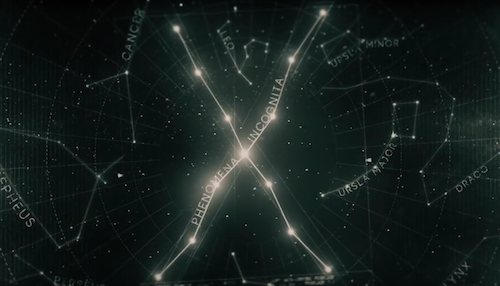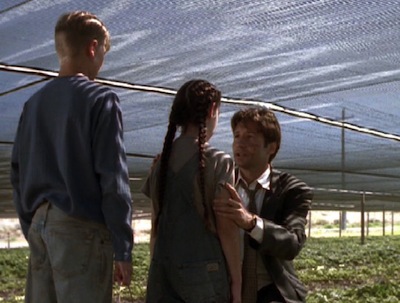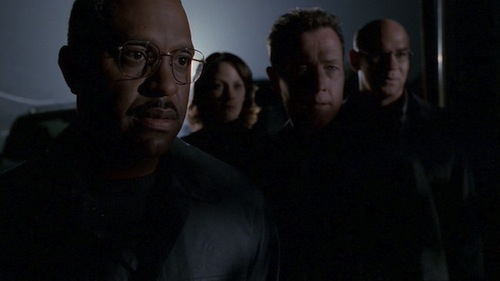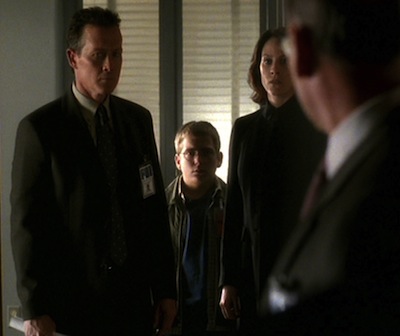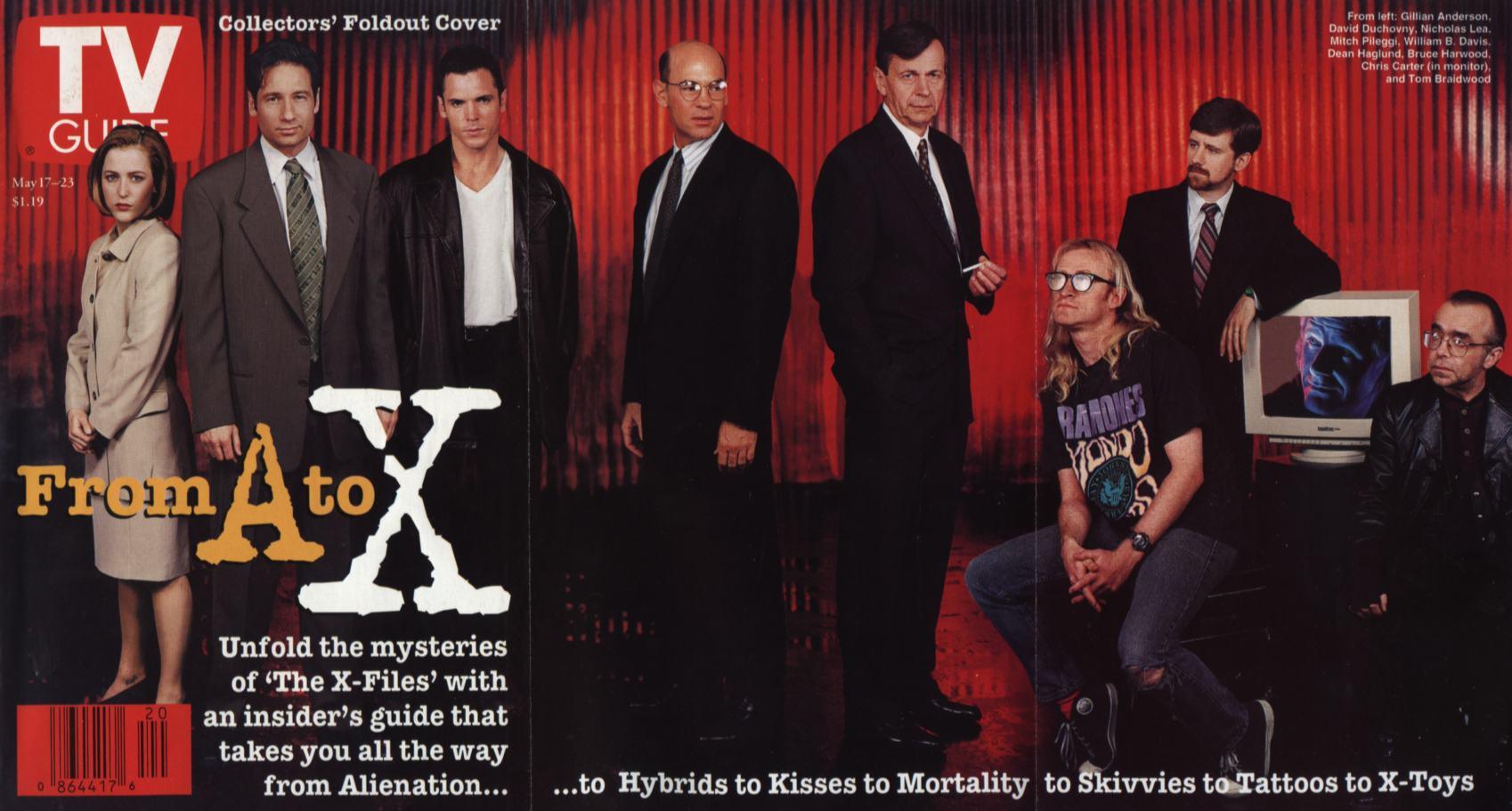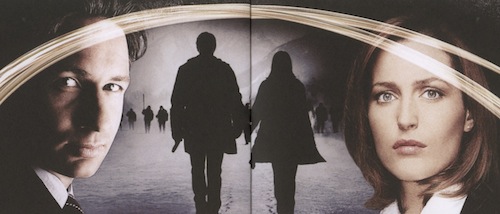After looking at what was left unsaid in Part 1 and a quick sociopolitical analysis of the past two decades in Part 2, we finally look here at The X-Files’ future in terms of where the storylines could go compared to the state of the show and its mythology after nine years and two movies.
Part 3: Where could it go?
The X-Files wasn’t big on making changes to its core formula. It was pushed outside its comfort zone when Gillian Anderson was pregnant in early season 2, creating the seminal storyline of Scully’s abduction. It worked around actors’ availability in season 5 due to the shooting of Fight the Future, coming up with episodes like the Lone Gunmen-focused 5X01: Unusual Suspects or the flashback 5X15: Travelers. It promised big changes by assigning two different agents to the X-Files in the first half of season 6, Spender and Fowley, but went nowhere with that. It promised even bigger changes by ending the core of the mythology in 6X12: One Son, but tried to tell stories around that and not addressing the fallout of these events for the rest of the season and the next. It introduced new characters in season 8 and 9 but still built the story around the old ones.
The X-Files really became more about Mulder and Scully than the “X-Files” cases in season 6. In front of the camera, we were following X-Files-like cases investigated by two agents no longer on the X-Files bureau, who either did it out of leisure (6X04/05: Dreamland, 6X08: How The Ghosts Stole Christmas) or stumbled upon that out of coincidence (6X15: Monday). Behind the camera, the X-Files production had changed location, a decision that impacted literally hundreds of people, to accommodate the leading star’s wishes. It became even more so about Mulder and Scully in season 8 and 9, ironically, when it was trying to pass the torch to new agents but tried to keep the older audience by using continuously Mulder’s return as a selling point and making the search for Mulder the structuring plot line of season 8; then by keeping Scully and her “old mythology” baggage in season 9, still building the whole season around Scully and a missing character rather than around the two new agents.
So, presently, “The X-Files” is synonymous with “Mulder and Scully investigate paranormal phenomena”, and I wouldn’t expect this to change much in a revival series — up until (maybe) Carter, Duchovny and Anderson all call it a day and FOX decides to do a reboot.
Within that framework, there is a lot that can change. There have been many theories and fan fiction stories as to where things could go, literally numbering in the thousands. Let’s examine a few creative possibilities, based on hints that the show has left and some speculation. Warning: The list below is not necessarily where I want this to go. Careful what you wish for!
Mulder and Scully, Private Investigators
Our ex-agents investigate paranormal cases through their own consulting company, occasionally brushing with the FBI (or the Millennium Group), occasionally getting help from Skinner, Chuck Burks or a Lone Gunmen-like network of truth-seekers. Mulder can fulfill his fantasy of living in a trailer like Max Fenig’s. Mulder’s obsession wouldn’t stop after he left the FBI, but finding a motivation for Scully to do this would be trickier. It could involve the quest for William.
Of course this is the opposite option of them joining the FBI again, or acting as consultants exclusively with the FBI (like Frank Black). The FBI certainly gives access and authority they wouldn’t otherwise have, and provides them with forensic, medical, criminal records, and all kinds of resources, like Danny. Them becoming agents is certainly the decision that makes the most sense in terms of brand recognition. It is practical, obvious, predictable. I Want To Believe and the comics Season 10 both went that way, making their career as FBI agents or FBI consultants intrinsically linked with their “quest for the truth”.
However, acknowledging the passage of time, they are no longer the young agents that are sent out on the field doing all the work from the ground up; had they built a career in the FBI they probably would have moved to more managerial positions and would be training or overseeing other agents, like Skinner did for them, than being in the field themselves. Which brings us to…
The X-Team: more members, more offices
Mulder and Scully are the experienced Special Agents In Charge who head a team of younger Agents in the field. In line with the “big franchise” aspect, the X-Files can become a show with not just two leads who do everything, but an entire team with agents in the field, agents specialized in forensics or medicine, agents more involved in the internal politics of the FBI… In short, an ensemble show like we usually get in cop shows. This had really started in season 9 already: not just Scully and Doggett, but Scully, Doggett, Reyes, Skinner, Kersh, Follmer. Scully was no longer an agent in the field but a doctor training younger agents in Quantico. While this direction was forced on the show due to cast changes behind the camera, it was also due to the writers looking for ways to make the show different after nearly two hundred episodes strictly centered around two leads.
Keeping with the franchise idea in a globalized world, one can imagine a “core” team (or core series) with Mulder and Scully and other X-Files divisions and teams (or mini-series spin-offs) spread across the country or the world. Like “CSI” and its multiple spin-offs or “Doctor Who” and “Torchwood”, the recombinations and cross-over possibilities are multiple.
This is the “next generation X-Files” direction, that was so abhorred by a large part of the fandom during the airing of seasons 8-9, but is really a natural evolution of many long-lived shows. The fact that a large part of the fandom rejected it shows how intrinsically linked are the X-Files with Mulder and Scully. Perhaps FOX will want this possibility for the future to be thought of and prepared, introducing a couple of younger agents, spending some time with both the old and new generations, then allowing Carter/Duchovny/Anderson to retire while FOX continues on with the new agents. But as long as the head trio is game to continue, the next generation or reboot is still a thing of the future.
Colonization: not a resolution
What a resolution to give to the mythology’s main hook? How final can the conclusion be when it comes to a replacement of the human population by aliens?
The X-Files built a reputation out of treating fantastic stories realistically, placing them in our world, present time and in everyday settings. Even if Mulder searched for undeniable proof of the existence of extraterrestrials or of some paranormal phenomenon, he was doomed from the start: if he found this proof and presented it everywhere for the world to believe, we would instantly no longer be in the same universe as the X-Files and all credibility the show built would crumble. Like for true religious faith, one has to believe even if he spends his entire life without proof, without certainties. When Mulder and Scully did find parts of the truth, it was a personal revelation that didn’t go beyond themselves. In 6X22: Biogenesis Scully tells Mulder of the end of the Syndicate “after all you’ve uncovered […] you exposed their secrets. I mean, you’ve won. What more could you possibly hope to do or to find?” as if personal knowledge was enough. In 7X22: Requiem Mulder is told that “investigating your sister’s abduction and the government conspiracy around it, both of which have been resolved” as if for the FBI Mulder’s (and the viewer’s) own closure was equivalent to revelation to all. This is removed from the energy of Scully and Mulder of earlier seasons who not only wanted knowledge but also justice: Scully in 3X02: Paper Clip: “I’ve heard the truth, Mulder. Now what I want are the answers.” Mulder in 3X10: 731: “I want them accountable for what did happen. I want an apology for the truth.”
Yet as discussed earlier on Eat The Corn on the occasion of the (real-world) December 22, 2012, this lack of clear resolution is intrinsic in perhaps all of Ten Thirteen shows. It is about the quest, the doubt, the absolutes, rather than the answers. About “fighting the future” in the face of forces that seem too big even to comprehend, but not ever reaching to a point where stopping to fight is acceptable. “Don’t give up“.
Thus, what could happen about colonization? An “Independence Day” scenario where ships appear and explosions ensue? Carter already dismissed that by having Mulder pee on that poster in Fight the Future; far too caricaturistic. The most likely option is that colonization is or has been postponed, and its menace still hangs over us like a sword of Damocles. Whether some actions secretly countered the invasion in 2012, or the invasion started only it is happening insidiously underground and very progressively, or the 2012 date was misunderstood by religious cults, the colonization will remain. Even not referencing it will not make its threat go away. Like for the Christian Apocalypse, its believers will say that “the date is set” but God has its ways.
Let us then explore some creative possibilities that could add some spice to the apparent scenaristic dead-end of the colonization — possibilities that express some big remaining uncertainties to the mytharc: is the William prophecy real? are the Creation Ships coming from the Black Oil alien race? were Supersoldiers created by the Black Oil race or by the Shapeshifters race?
“Only to awaken another enemy”: trading our Alien Overlords
The Colonist aliens (i.e. the Black Oil, or the Greys, in case you have lost count) have always been presented so invincible and powerful, God-like at times, that their superiority over any resistance the low-tech human race could present appears doomed. But what if the Colonists are really much more fragile than they appear? For all we know, their entire force resides in their superior technology, but their numbers could be few and their forces on Earth could be little more than the large ship in Antarctica and the UFOs we have seen.
So the Faceless Rebels could have really won the “war for Heaven and Earth”, eventually, after their trail of fire in 5X14: The Red and the Black and 6X12: One Son, perhaps with the help of certain ex-members of the Syndicate or of the Russian syndicate (along with Krycek and Covarrubias, as was originally planned for season 7 according to rumors). With the Black Oil aliens out of the way, the race of the Faceless Rebels might betray their human allies and make their own plans for colonization of Earth.
There are some who have also theorized that this happened already, and that the Supersoldiers we see over seasons 8-9 really are envoyés of the Faceless Rebels, and not a secret weapon of the Black Oil aliens that got activated after the Syndicate was exterminated. This could be a possibility, given that the evidence to tie the Black Oil aliens to the Supersoldiers is mainly based around their biology, and the Faceless Rebels’ biology is akin to the Black Oil’s (as evidenced by similarities with hybrids, see the relevant dossier). Thus, confusing things a little more in the alien bestiary of the X-Files, there is still colonization looming but no specific invasion date.
We are all aliens
A story thread extensively used in the X-Files is the idea that we humans are all part alien, due to what proves to be alien intervention in our creation. This idea finds echoes not just in the concrete biological sense but also in an abstract, somewhat esoteric sense: “The truth I’ve been searching for? The truth is *in* you” Mulder tells Scully in 5X14: The Red and the Black. It would only make sense then that the resolution to the show’s mythology would involve our biology and our common ancestry with the aliens.
The X-Files’ central mythology is essentially a story of biological warfare at a cosmic scale. It joins both Mulder’s beliefs in extraterrestrial life and Scully’s basis in science via her expertise in medicine. The objective then could be to prevent colonization thanks to biology with the latest biological weapon against the Black Oil virus invader.
A possibility is to develop a storyline around the idea that we already have the solution to the problem: ‘immunity is inside us’. We have seen occurrences where humans have activated alien genes that give them special abilities and perhaps immunity (Gibson Praise, Mulder in 7X04: Amor Fati). We have seen occurrences where humans are naturally immune to the Black Oil (the Huichol Indians, 8X16: Vienen). We have seen a vaccine against the Black Oil be developed in Siberia, perhaps thanks to the presence of magnetite from meteors weakening the Black Oil or to an already present partial immunity among the local folk. Joining pieces of information together, this could even all be tied together in a single string of immunity among humans: Gibson Praise might have ascent from the Philippines, colonized by Asia; American Indians, ancestors of the Huichol and the Anasazi, reached the American continent via Siberia by crossing the Bering Strait; alternate names for 5X20: The End were Zhigansk and Okhotsk, two cities in Siberia, one a meteor crash site, the other a port city close to the Bering Strait. Perhaps the vaccine we saw being developed is derived from that natural immunity — appropriately, Native Americans would give the answer to the White Man and the world. See 5X20: The End, 8X16: Vienen and 9X19/20: The Truth for more; granted, this theory might contain a more than considerable amount of speculation.
Of course, William, the product of the union of two people who have had precedents with biological experiments with the Black Oil, not to mention a fertility possibly recovered thanks to alien technology, would be the natural and ideal candidate for being the source of the biological solution to counter the aliens. By doing so, he would also be fulfilling prophecies around his role in countering the colonization.
Thus, an antidote could be devised, rendering the biological attack of the colonization moot. It would have to be delivered, without the aliens or Supersoldiers knowing about it. Like the Syndicate made use of fertility clinics, obligatory inoculations and even the water supply system (9X01/02: Nothing Important Happened Today), so the human resistance could make use of these same tools to deliver an antidote to everyone. Any surviving cloned hybrids, grown from the start to be experts in biology (e.g. 4X15: Memento Mori), could be part or even orchestrate that resistance network. Conducting a secret underground war to prevent an all-out military war would be fitting with the low-key approach that the X-Files has had form the beginning. If Mulder and Scully were to stumble upon this underground network in an investigation, using the Syndicate’s tools in secret for a good purpose, could even lead them to mistake it as nefarious, ironically.
This is but one way with which a non-apocalyptic, biology-based war on the future of colonization could develop.
Redux III: A conspiracy of men
How to make the mythology feel more real and thus scarier in a time when the omnipresence of personal cameras has not proven the existence of UFOs and when the alien craze is not what it used to be in the 1990s? Make it more about the human aspect of it. The X-Files understood early on the importance to have human villains opposing Mulder and Scully instead of impersonal aliens, given the drama and emotion and personal backstories that could be created as we got to know the conspirators better. Could The X-Files pull another try at taking the aliens entirely out of the picture and make it about humans only, like it tried with 4X24: Gethsemane and 5X02/03: Redux? At the time the “rational” explanation was an impressive narrative achievement but it did leave a lot of in-universe questions to be explained; the “Mulder as skeptic” arc that followed was, for many, too sudden and not believable; and then came mythology episodes that firmly confirmed the alien forces at play.
Still, in 9X19/20: The Truth, Mulder, and Carter via him, ends his testimony with: “[I’ve learned] that the devil is just one man with a plan but evil, true evil, is a collaboration of men which is what we have here today“. The choice of words is interesting, especially since Mulder knows that Supersoldiers are involved in the ploy to have him on trial. Today, after all we have seen, a coup à la Gethsemane would be unrealistic. However, there is flexibility.
With memory manipulation (1X01: Deep Throat), hypnosis (3X20: Jose Chung’s “From Outer Space”), proof manipulation (photos in 1X16: E.B.E., whole bodies in 4X24: Gethsemane) and given how easily false information can be planted and how fake footage can be produced with the technologies of today, the show could argue that once you manipulate enough memories and plant enough false evidence, you manipulate the way people remember about things: you effectively change history. There are hardly any eye witnesses of the Roswell crash left alive, for example; what we know about it is what we are told about it. This could insert much-needed doubt and uncertainty as to what “the truth” is.
The show could also take focus out of the aliens and more on how the various conspiracies have used the fear of the aliens as a tool for mass psychological manipulation: under a greater menace, you are willing to turn the eye when those who state they will protect you make immoral things. This thread, stated in Kritschgau’s memorable speech in 5X02: Redux, could fit nicely with the post-9/11 Patriot Act, the surveillance culture and associated loss of liberties in exchange for security.The show could even go as far as to downplay the role the aliens have played in the past. We mentioned above how the forces of the Colonists might be much fewer than what we are led to believe; perhaps the Colonists had also a much lesser hand in events than what we thought. They do exist but beyond specific occurrences like the seminal Roswell crash of 1947 or the deal with the Syndicate in 1973 their appearances are rare; the abductions and experiments are man-made, the UFO crashes is more or less advanced technology, the whole manipulation is more or less made known depending on each one’s access to top secret information.
On the credibility of this option, given how much we have seen on The X-Files, your mileage may vary. I was certainly very seduced by the ideas introduced in the “Redux” trilogy. It would give new windmills to chase for Mulder, and could perhaps inverse the roles with Scully, as she might defend the aliens’ presence given the quasi-religious experience she had when discovering that spacecraft in Africa in 6X22: Biogenesis. Which brings us to…
Creation Ships: The voice of God
The show could decide that it’s all about God. The aliens as an allegory for God is something the X-Files have played with several times in the past, with visual imagery of alien abductions reminiscent of religious rapture, with Mulder’s quest for life in the skies paralleled to Scully’s religious belief, and of course with the idea that the human race is a creation by aliens. “What we call God is only alien, an intelligence much greater than us” the Cigarette-Smoking Man says in 7X22: Requiem. Yet this “ancient astronaut” theory cannot give the whole picture though: if “they” created us, who created “them”?
It was never fully ascertained that the “Origin Ships” seen in 6X22: Biogenesis and 9X11: Providence belonged to the same alien race as the Black Oil. This was hypothesized because the pieces fit, the Ships seeding life so that it can be later colonized by the “Purity” race, and there was no need to complexify things further with more alien races. But there is enough uncertainty there to build a different story. These “Origin Ships” could come from elsewhere; contact with them is linked with religious awe and stories of prophets and prophecies (the old religions in Biogenesis, the William prophecy in Providence). The Ships are linked to William (the one in Biogenesis possibly returned Scully her fertility; the one in Providence called for William and safeguarded it from the fire that killed all the others); the Supersoldiers themselves might not know everything about these Ships and their interest in them would be similar to their interest in William, a religious yearning to understand something that is mysterious for them as well.The search for the truth on these Ships could instill some interesting new dynamics on the show, and would also make us humans and the alien Supersoldiers all equal before this grander religious quest.
The voices of the dead
Actually, Chris Carter’s scripts have grown more and more religious as time has passed. The aliens-as-God is only subtext until it becomes the core of the mythology in the last three seasons. Christian symbols abound around the immaculate conception and birth of William. I Want To Believe is a lot about faith (Christian faith, specifically). The turning point really was Millennium’s “Seven and One” near the end of the show’s last season, an episode preceding Biogenesis and the rest; it was Carter’s last script for Millennium, and gave Frank Black the closest he could get in terms of character development and closure by turning him towards religious faith (Catholic Christian, specifically): “it is the light which guides me now“. Initially a person with doubts, Carter’s personal faith perhaps matured and strengthened during those years, which showed in his work. Perhaps this faith is more strong now than before — in “The After”, discussion of the Christian Apocalypse and the whole premise which might have proven to be a take on Dante’s “Inferno” is proof towards that — and religious themes in The X-Files will become the big focus. That is fine as long as Carter is subtle, intelligent and perhaps ambiguous about it, indeed the best years of the show are associated with times when several versions of “the truth” were possible.
Another interesting point that shows The X-Files being steered towards more spiritual and religious ground is the importance of ghosts in the show’s finale. Ghosts and paranormal phenomena in general were kept in principle out of the very science fictional mythology, yet in later seasons the lines began to blur: the Biogenesis trilogy, but also the Walk-ins in 7X11: Closure, and Krycek and X’s ghosts in 9X19/20: The Truth. Mulder summarizes what he believes in not as something related to alien life, but something much more spiritual: “I want to believe that the dead are not lost to us. That they speak to us as part of something greater than us, greater than any alien force. And if you and I are powerless now, I want to believe that if we listen to what’s speaking, it can give us the power to save ourselves.” This echoes very well 3X16: Apocrypha where Johansen memorably told Scully: “We hear them everyday. They talk to us, They haunt us. They beg us for meaning. Conscience… it’s just the voices of the dead, trying to save us from our own damnation.” Scully later says: “I think the dead are speaking to us, Mulder, demanding justice. Maybe that man was right. Maybe we bury the dead alive.”
The X-Files mythology never fully explored that, but reminding that thread in the show’s finale, of all places, is significant. Also, a parallel is made between the forces of the dead and the forces of the aliens: one, obviously, is a force of good, the other a force of evil. By extension, the fate of humanity is then framed between those two forces, and the fight against colonization becomes a fight where supernatural forces could have an unexpected role.Indeed, to the Black Oil — black, alien, malevolent — can be opposed the Walk-ins — beings of light, well-intended. Both are beings that occupy a human host, but one is the light that counter-balances the darkness of the other. There is some visual imagery that could illustrate that, with the black filter in front of the eyes of a Black Oil-infected host, and the white aura of ghost appearances in the show (7X10: Sein und Zeit / 7X11: Closure, specifically). The show even toyed with the idea of absolute, spiritual evil as a kind of infectious virus in 8X17: Empedocles, where fire behind the eyes signified that person was infected — just an episode away from 8X16: Vienen and its Black Oil-infected oil workers. Unexpected allies of the spiritual kind could be a nice twist to the colonization storyline.
The show goes on
The possibilities are not endless but the mythology is not in the dead end it is often being described to be.
There are other possibilities as well, such as developing a different mythology altogether. Seasons 8 and 9 seemed to be building towards a Doggett and Reyes-specific mythology on evil as an immaterial force and the disappearance of Doggett’s son Luke, with episodes like 8X06: Invocation, 8X17: Empedocles, 9X04: Hellbound, 9X16: Release. It is a bit late in the game for Scully and Mulder to change the mythology as radically but it is a possibility. In a revival show with much fewer episodes per year than 24, what is mythology and what is not could blur and the so-called monster-of-the-week shows would have to be as important to the central characters and with high stakes as the so-called “mythology” ones. The show could even take a radical turn towards realism and really have episodes where Mulder is wrong and Scully is right, where the paranormal phenomenon is disproven and the scientific explanation is proven as correct — possibly Carter’s initial plan before he saw the difficulties in making such a show as exciting as having the mysterious and the paranormal “win”.
Whatever direction the continuation of the show takes, it will have to reintroduce the central divide that made the X-Files so interesting to watch: the debate between the “skeptic” and the “believer”. The debate provides different worldviews, the debate exists because there are things that are uncertain, because there are mysteries unsolved. In the later seasons of the show, in particular during season 7, Scully and Mulder’s views on things seemed to be converging, appropriately enough since they were reaching the end of the show and their romantic union was also a union and synthesis of ideas. As good as that ending was, that divide has to be there to drive the show. It does not have to mean disagreement on everything or a return to how things were in 1993 or the end of their relationship; it does not even need to be over the existence or non-existence of extraterrestrials. But their intellectual discourse has to have a basis on a divide, and only if there is a divide will there be uncertainty and the truth can be “out there”.
There are possibilities and fan theories. And then there is what Carter has decided to do. Options are discarded and future paths are not chosen: the story Carter will choose to tell will be one direction only. He seems to have the ambition to tell it over more than “just” these six episodes, once more postponing the resolution again, but giving more ample ground to storytelling and experimentation.
Now, for the spoilery part. There are lots of spoilers out there, some of which are very hard to avoid, and some of which seriously spoil the fun of discovering these episodes when they will air. I will not participate in spreading confirmed spoilers or rumors around… but I will link to this trailer:
So. Weary Mulder and reluctant Scully, check. Dark spaces and flashlights, check. Supportive Skinner, check. Shadowy old informant, check. The immortal Cigarette-Smoking Man, check. Modern paranoia and secrets from our post-World War II past, check. Beautiful photography, check. What is here can be compared to the three-part analysis of these Eat The Corn dossiers; we could do a minute analysis of the trailer but at barely over three months from the premiere I will leave that to the whim of each one.
The date is set for January 2016 — but before that, the world premiere of the first episode, Carter’s “My Struggle“, in MIPCOM, Cannes, France, today, October 6. Expect to find spoilers everywhere.
If you want to refresh your memory on the mythology, you can delve into our synthesis, the Eat The Corn Mytharc Primer.
